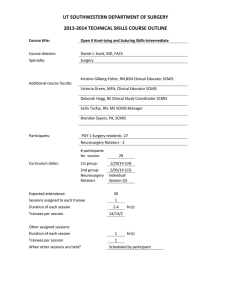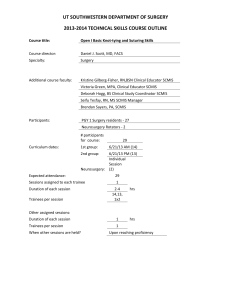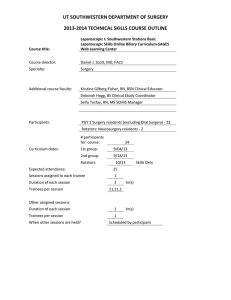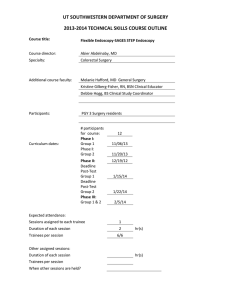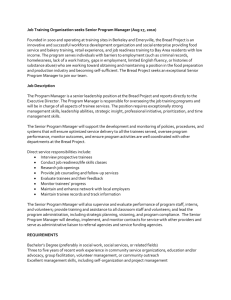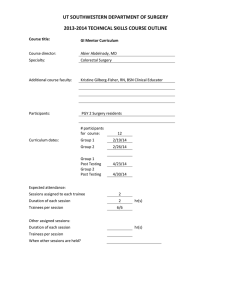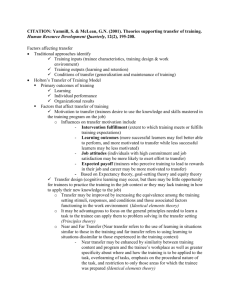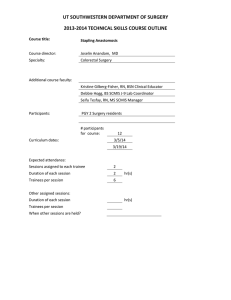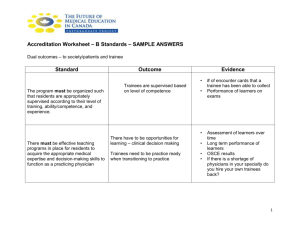UT SOUTHWESTERN DEPARTMENT OF SURGERY TECHNICAL SKILLS COURSE OUTLINE
advertisement
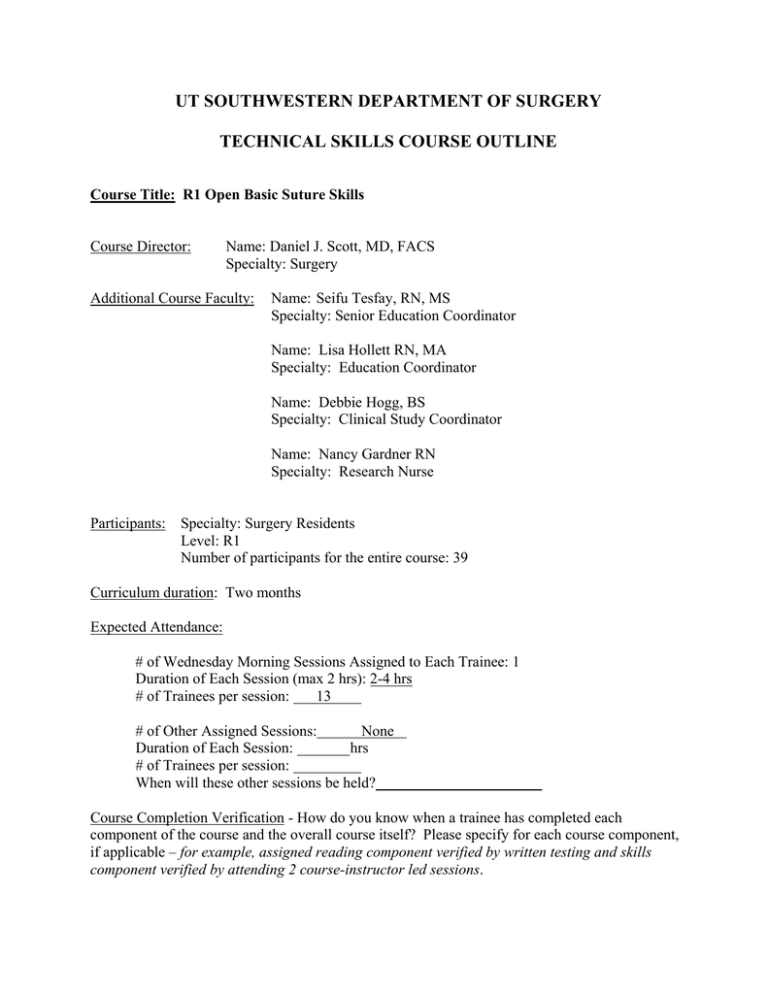
UT SOUTHWESTERN DEPARTMENT OF SURGERY TECHNICAL SKILLS COURSE OUTLINE Course Title: R1 Open Basic Suture Skills Course Director: Name: Daniel J. Scott, MD, FACS Specialty: Surgery Additional Course Faculty: Name: Seifu Tesfay, RN, MS Specialty: Senior Education Coordinator Name: Lisa Hollett RN, MA Specialty: Education Coordinator Name: Debbie Hogg, BS Specialty: Clinical Study Coordinator Name: Nancy Gardner RN Specialty: Research Nurse Participants: Specialty: Surgery Residents Level: R1 Number of participants for the entire course: 39 Curriculum duration: Two months Expected Attendance: # of Wednesday Morning Sessions Assigned to Each Trainee: 1 Duration of Each Session (max 2 hrs): 2-4 hrs # of Trainees per session: 13 # of Other Assigned Sessions: None Duration of Each Session: hrs # of Trainees per session: When will these other sessions be held? Course Completion Verification - How do you know when a trainee has completed each component of the course and the overall course itself? Please specify for each course component, if applicable – for example, assigned reading component verified by written testing and skills component verified by attending 2 course-instructor led sessions. X Attendance-based - based on the trainee attending all designated sessions Entire Course - Is the entire course solely based on attendance? X Part of the Course – Is attendance to designated sessions required in addition to other components, as listed below? Repetition-based - based on the trainee performing a specified number of repetitions Component(s): # of Repetitions: X Proficiency-based - based on the trainee reaching a specified level of proficiency Component(s): Skills Training Method for determining proficiency: Proficiency levels reached on Tasks 1-12, as verified by a proctor according to score sheets. Timeline: Tasks 2-6 completed by one month .Entire curriculum completed by two months. Date to be determined. Written Testing - based on passing a written test Component(s): Documentation of Watching Videos/CD’s/Web-based Materials - based on proctor or instructor verification that the trainee has watched the specified videos/CD’s/Web-based materials Component(s): Other Methods (specify method) Component(s): Self-study or Self-practice (Is self-study or self-practice an expectation of this course?) No X Yes (specify) Self-study component(s): Estimated time requirements for self-study: hrs. During what phase(s) of the course is self-study to be completed? Self-practice component(s): Skills Training Estimated time requirements for self-practice: 10-15 hrs. During what phase(s) of the course is self-practice to be completed? Training Phase Training Location(s): Skills Lab Equipment/Simulator(s): 1. Knot tying boards 2. FLS suture models 3. Daisies Other Resources (Textbooks, CD-ROMS, Videos, etc): 1. SCMIS Open Basic Skills Video Tutorial 2. Suture books Educational Scope: X Skills – does this course teach technical skills? Component(s): Basic Laparoscopic Skills Cognitive - does this course teach cognitive (knowledge) material? Component(s): Judgment – does this course teach trainees judgment (intraoperative or clinical decision-making)? Component(s): Learning Objectives: Acquire proficiency in open basic skills, including needle driver handling, knot tying, and suturing. Summary of Curriculum, Teaching Methods, and Resource Utilization (For each component, please specify what material will be taught during each session, how will the material be taught, and what teaching materials will be used. Please also specify the overall format of the course including expectations required for successful course completion): During orientation in June, all interns will be oriented to the R1 skills curriculum. All trainees will then attend one 4 hour assigned session during July. During this session, an introduction to the open skills tasks and the curriculum will be afforded and an orientation to the video materials, the models, and the scoring system will be provided. Trainees will perform 1 repetition of each of the 12 tasks as a pre-test. During this same 4 hour assigned period, all trainees will also be pre-tested on the FLS training module after a brief introduction; this will involve performing 1 repetition of each of the 5 FLS tasks. This will serve as a baseline assessment of laparoscopic ability for use to document improvement after subsequent training. After pre-testing, trainees will be expected to self-practice on the open basic tasks, with data on performance recorded for each repetition, until proficiency levels are reached for all tasks for all modules. Trainees must log in and log out of the attendance system to track total training time. Training will be conducted in a self-study fashion and trainees will be encouraged to repetitively watch the video tutorials during training to review appropriate techniques and tricks for performing the tasks. Proctors will be available to assist in training and to provide additional feedback as needed. Once proficiency has been achieved, each trainee will notify the education coordinator, who will verify achievement of proficiency on all 12 open basic tasks according to the documentation on the score sheets. Each trainee will then schedule a 1 hour post-test session with the proctor and will perform 1 repetition of each task while being graded by the proctor. Score sheets will be collected and filed. Methods for giving feedback to learners (Formative and Summative): Training will be conducted in a self-study fashion and trainees will be encouraged to repetitively watch the video tutorials during training to review appropriate techniques and tricks for performing the tasks. Proctors will be available to assist in training and to provide additional feedback as needed. Trainees will also be given a report of their pre and post-test scores and improvement for the skills component. Methods for Assessment of Learners: Established metrics for skills training. Methods for Remediation: (How are individuals who need remediation identified and how is remediation facilitated?) Anyone who cannot achieve proficiency on any of the tasks will be remediated by proctored training sessions. Methods for Course Evaluation: By Learners: E-Value online system Other Methods (specify) By Faculty: E-Value online system Other Methods (specify) Materials: Specify the types of materials, manufacturer (if pertinent), and total quantity needed. 1. Knot tying boards – 10 stations, + 1 replacement = 20 2. FLS suture models/penrose drains - 200 3. Daisies – 1 per trainee = 39 2-0 silk ties, regular length, 10 packs per trainee x 39 trainees = 390 packs 3-0 undyed polysorb, 30 cm, tapered needle, 20 per trainee x 39 trainees = 780* * cut to 40 cm and re-use 5 times per repetition to conserve suture 3-0 nylon, 18 inch, tapered needle, 40 per trainee x 39 trainees = 1560
